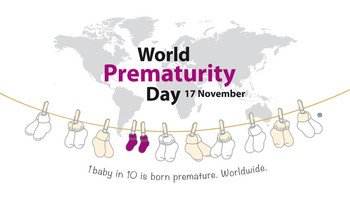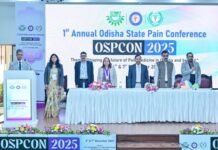Better environment necessary for pre-mature babies.
World observes 17th November every year as World Prematurity Day to create awareness of pre-term birth and the concerns of preterm babies and their families.
The infants born before the completion of 37 weeks of pregnancy are referred as premature babies. In India, out of 26 million live births annually, 3.5 million are preterm and globally the figure is around 15 million.
India is at the top of 10 countries contributing 60% of the premature babies in the world (WHO report: Born too soon). European parent organization initiated the program to mark 17th November as international awareness day for preterm birth in 2008, which got recognized as World Prematurity Day since 2011.
At present more than 200 countries, government and non-government organizations, UN agencies, medical and health organizations have come together to stand with the family of lives that lost to pre-term birth 400, to create an environment for better care for the premature babies and to adopt every possible strategy to eradicate preterm births.
A study published in reputed scientific journal ‘Lancet’ claims premature birth as the prime killer of young children, accounting for 1.1 million deaths out of 6.3 million deaths of children under the age of 5.
The increasing rates of preterm births are associated with various societal and medical factors. Age of mother, if she is below 17 or above 37 years of old enhances the risk of preterm delivery, poor nutrition, heavy physical work load, short period between pregnancies, infertility treatments, smoking, alcohol or drug abuse, all contribute to this phenomenon.
In addition, history of second-trimester abortion or more than two first-trimester abortions or previous premature delivery also increase the risk of preterm delivery. Clinically relevant is the positive correlation with medical conditions like preeclampsia (elevated blood pressure and protein in the urine after the 20th week of pregnancy), HELLP syndrome (Hemolysis, Elevated Liver enzymes, Low Platelet count), uterine or cervical abnormalities, recurring vaginal infections, kidneys, bladder and urinary tract or chronic disease like obesity, high blood pressure, diabetes, inflammatory bowel disease (IBS), kidney disease, lupus or thrombophilia. Hereditary factors as well play a significant role in elevating risk of pre-term delivery.
Medical advancement and new obstetrician techniques have improved the scenario of pregnancy and delivery worldwide.
However, sufficient research and technological innovation is lacking in the precise prediction of ‘at risk’ pregnant women and the effective interventions to prevent prematurity. If the risk can be accessed and interventions are implemented, the pre-term labor can be delayed.
The increase in the gestation period is directly proportional to the survival chances of the new born with approximately 50% at 25 weeks gestation to ~90% at 28 weeks and over 97% at 33 weeks gestation period.
The babies born preterm can be saved with timely interventions such as administration of steroid injections to mother with preterm labour to speed up the development of baby lungs. The baby after birth should be kept warm, clean and well fed. Kangaroo mother care, where the infant is kept in skin-to-skin contact with the mother to keep the baby warm and facilitate breastfeeding.
In addition, appropriate administration of basic antibiotics can also save lives, such as amoxicillin to treat pneumonia and injection antibiotics to fight serious infections. It is also important to educate the family of the premature babies for the proper postnatal care of the mother and child. Family should be vigilant about the activity of the child, like weight and height gain, neuro-muscular coordination, vision, hearing ability. If by God forbid, parents observe some abnormality, they should take medical aid without delay. It can be improved only with proper and timely therapy.
In the observance of World Prematurity Day, we need to understand the struggle of these tiny treasures go through. They have to fight against all odds, be it low birth weight, fragile underdeveloped skin, poor immune system, breathing trouble and so many.
Though, many of them come out strong, like Sir Isaac Newton, Albert Einstein, Charles Darwin, Nepolian Bonaparte while many lose the battle leaving their families teary eyed. We should all pledge our support for creating healthy, happy and nutritious life for would be mothers, so that a major preventable fraction of preterm deliveries can be avoided.
At the same time we make honest efforts to develop all possible strategies to ensure the survival and healthy growth of our preemies.
Happy Prematurity Day and Month!!!
Dr. Sumona Karjee Mishra
Social Innovation Immersion Programme Fellow, DBT-BIRAC
KIIT-TBI
Email: sumonakarjee@gmail.com




























